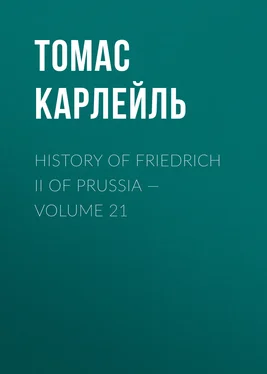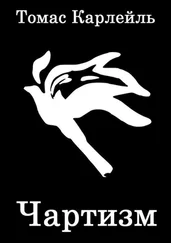Томас Карлейль - History of Friedrich II of Prussia — Volume 21
Здесь есть возможность читать онлайн «Томас Карлейль - History of Friedrich II of Prussia — Volume 21» — ознакомительный отрывок электронной книги совершенно бесплатно, а после прочтения отрывка купить полную версию. В некоторых случаях можно слушать аудио, скачать через торрент в формате fb2 и присутствует краткое содержание. Жанр: foreign_prose, История, literature_19, foreign_edu, foreign_antique, на английском языке. Описание произведения, (предисловие) а так же отзывы посетителей доступны на портале библиотеки ЛибКат.
- Название:History of Friedrich II of Prussia — Volume 21
- Автор:
- Жанр:
- Год:неизвестен
- ISBN:нет данных
- Рейтинг книги:3 / 5. Голосов: 1
-
Избранное:Добавить в избранное
- Отзывы:
-
Ваша оценка:
- 60
- 1
- 2
- 3
- 4
- 5
History of Friedrich II of Prussia — Volume 21: краткое содержание, описание и аннотация
Предлагаем к чтению аннотацию, описание, краткое содержание или предисловие (зависит от того, что написал сам автор книги «History of Friedrich II of Prussia — Volume 21»). Если вы не нашли необходимую информацию о книге — напишите в комментариях, мы постараемся отыскать её.
History of Friedrich II of Prussia — Volume 21 — читать онлайн ознакомительный отрывок
Ниже представлен текст книги, разбитый по страницам. Система сохранения места последней прочитанной страницы, позволяет с удобством читать онлайн бесплатно книгу «History of Friedrich II of Prussia — Volume 21», без необходимости каждый раз заново искать на чём Вы остановились. Поставьте закладку, и сможете в любой момент перейти на страницу, на которой закончили чтение.
Интервал:
Закладка:
"I speak these words in sorrow of soul; words which probably you will not believe. Which only Fate can compel you to believe, one day, if they are true words:—you think, probably, they are not? Me at least, or interest of mine, they do not regard. I speak them from the fulness of my heart, and on behest of friendship and conviction alone; having the honor at this moment to bid you and your Republic a very long farewell. Good-morning, for the last time!" and so EXIT: to Rome (had been Cardinal once); to Paris and the society of Ninon's Circle for the few years left him of life. ["Died 16th December, 1672, age 63."]
This poor John had had his bitter experiences: think only of one instance. In 1662, the incredible Law of LIBERUM VETO had been introduced, in spite of John and his endeavors. LIBERUM VETO; the power of one man to stop the proceedings of Polish Parliament by pronouncing audibly "NIE POZWALAM, I don't permit!"—never before or since among mortals was so incredible a Law. Law standing indisputable, nevertheless, on the Polish Statute-Book for above two hundred years: like an ever-flowing fountain of Anarchy, joyful to the Polish Nation. How they got any business done at all, under such a Law? Truly they did but little; and for the last thirty years as good as none. But if Polish Parliament was universally in earnest to do some business, and Veto came upon it, Honorable Members, I observe, gathered passionately round the vetoing Brother; conjured, obtested, menaced, wept, prayed; and, if the case was too urgent and insoluble otherwise, the NIE POZWALAM Gentleman still obstinate, they plunged their swords through him, and in that way brought consent. The commoner course was to dissolve and go home again, in a tempest of shrieks and curses.
The Right of Confederation, too, is very curious: do readers know it? A free Polack gentleman, aggrieved by anything that has occurred or been enacted in his Nation, has the right of swearing, whether absolutely by himself I know not, but certainly with two or three others of like mind, that he will not accept said occurrence or enactment, and is hereby got into arms against its abettors and it. The brightest jewel in the cestus of Polish Liberty is this right of confederating; and it has been, till of late, and will be now again practised to all lengths: right of every Polish, gentleman to confederate with every other against, or for, whatsoever to them two may seem good; and to assert their particular view of the case by fighting for it against all comers, King and Diet included. It must be owned, there never was in Nature such a Form of Government before; such a mode of social existence, rendering "government" impossible for some generations past.
On the strength of Saxony and its resources and connections, the two Augusts had contrived to exist with the name of Kings; with the name, but with little or nothing more. Under this last August, as we heard, there have been about forty Diets, and in not one of them the least thing of business done; all the forty, after trying their best, have stumbled on NIE POZWALAM, and been obliged to vanish in shrieks and curses. [Buchholz ( Preussisch-Brandenburgische Geschichte, ii. 133, 134, &c. &c.) gives various samples, and this enumeration.] As to August the Physically Strong, such treatment had he met with,—poor August, if readers remember, had made up his mind to partition Poland; to give away large sections of it in purchase of the consent of neighbors, and plant himself hereditarily in the central part;—and would have done so, had not Grumkow and he drunk so deep, and death by inflammation of the foot suddenly come upon the poor man. Some Partition of Poland has been more than once thought of by practical people concerned. Poland, as "a house chronically smoking through the slates," which usually brings a new European War every time it changes King, does require to be taken charge of by its neighbors.
Latterly, as we observed, there has been little of confederating; indeed, for the last thirty years, as Rulhiere copiously informs us, there has been no Government, consequently no mutiny needed; little or no National business of any kind,—the Forty Diets having all gone the road we saw. Electing of the Judges,—that, says Rulhiere, and wearisomely teaches by example again and ever again, has always been an interesting act, in the various Provinces of Poland; not with the hope of getting fair or upright Judges, but Judges that will lean in the desirable direction. In a country overrun with endless lawsuits, debts, credits, feudal intricacies, claims, liabilities, how important to get Judges with the proper bias! And these once got, or lost till next term,—what is there to hope or to fear? Russia does our Politics, fights her Seven-Years War across us; and we, happy we, have no fighting;—never till this of Courland was there the least ill-nature from Russia! We are become latterly the peaceable stepping-stone of Russia into Europe and out of it;—what may be called the door-mat of Russia, useful to her feet, when she is about paying visits or receiving them! That is not a glorious fact, if it be a safe and "lucky" one; nor do the Polish Notabilities at all phrase it in that manner. But a fact it is; which has shown itself complete in the late Czarina's and late August's time, and which had been on the growing hand ever since Peter the Great gained his Battle of Pultawa, and rose to the ascendency, instead of Karl and Sweden.
The Poles put fine colors on all this; and are much contented with themselves. The Russians they regard as intrinsically an inferior barbarous people; and to this day you will hear indignant Polack Gentlemen bursting out in the same strain: "Still barbarian, sir; no culture, no literature,"—inferior because they do not make verses equal to ours! How it may be with the verses, I will not decide: but the Russians are inconceivably superior in respect that they have, to a singular degree among Nations, the gift of obeying, of being commanded. Polack Chivalry sniffs at the mention of such a gift. Polack Chivalry got sore stripes for wanting this gift. And in the end, got striped to death, and flung out of the world, for continuing blind to the want of it, and never acquiring it.
Beyond all the verses in Nature, it is essential to every Chivalry and Nation and Man. "Polite Polish Society for the last thirty years has felt itself to be in a most halcyon condition," says Rulhiere: [Rulhiere, i. 216 (a noteworthy passage).] "given up to the agreeable, and to that only;" charming evening-parties, and a great deal of flirting; full of the benevolences, the philanthropies, the new ideas,—given up especially to the pleasing idea of "LAISSEZ-FAIRE, and everything will come right of itself." "What a discovery!" said every liberal Polish mind: "for thousands of years, how people did torment themselves trying to steer the ship; never knowing that the plan was, To let go the helm, and honestly sit down to your mutual amusements and powers of pleasing!"
To this condition of beautifully phosphorescent rot-heap has Poland ripened, in the helpless reigns of those poor Augusts;—the fulness of time not now far off, one would say? It would complete the picture, could I go into the state of what is called "Religion" in Poland. Dissenterism, of various poor types, is extensive; and, over against it, is such a type of Jesuit Fanaticism as has no fellow in that day. Of which there have been truly savage and sanguinary outbreaks, from time to time; especially one at Thorn, forty years ago, which shocked Friedrich Wilhelm and the whole Protestant world. [See supra, vi. 64 (and many old Pamphlets on it).] Polish Orthodoxy, in that time, and perhaps still in ours, is a thing worth noting. A late Tourist informs me, he saw on the streets of Stettin, not long since, a drunk human creature staggering about, who seemed to be a Baltic Sailor, just arrived; the dirtiest, or among the dirtiest, of mankind; who, as he reeled along, kept slapping his hands upon his breast, and shouting, in exultant soliloquy, "Polack, Catholik!" I am a Pole and Orthodox, ye inferior two-legged entities!.—In regard to the Jesuit Fanaticisms, at Thorn and elsewhere, no blame can attach to the poor Augusts, who always leant the other way, what they durst or could. Nor is specialty of blame due to them on any score; it was "like People, like King," all along;—and they, such their luck, have lived to bring in the fulness of time.
Читать дальшеИнтервал:
Закладка:
Похожие книги на «History of Friedrich II of Prussia — Volume 21»
Представляем Вашему вниманию похожие книги на «History of Friedrich II of Prussia — Volume 21» списком для выбора. Мы отобрали схожую по названию и смыслу литературу в надежде предоставить читателям больше вариантов отыскать новые, интересные, ещё непрочитанные произведения.
Обсуждение, отзывы о книге «History of Friedrich II of Prussia — Volume 21» и просто собственные мнения читателей. Оставьте ваши комментарии, напишите, что Вы думаете о произведении, его смысле или главных героях. Укажите что конкретно понравилось, а что нет, и почему Вы так считаете.









